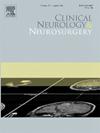胸椎间盘突出住院后再入院的发生率及预测因素。
IF 1.8
4区 医学
Q3 CLINICAL NEUROLOGY
引用次数: 0
摘要
目的:症状性胸椎间盘突出症(TDH)是一种较为罕见的疾病,可在神经影像学上偶然发现。TDH的手术干预仅占所有椎间盘病变手术的4% %,椎间盘病变最常用于脊髓病和神经根病。鉴于缺乏关于TDH住院后再入院率的出版物,我们的目标是建立90天全因再入院率和相关危险因素的基线指标。方法:使用2020年全国再入院数据库筛选今年前9个月内初步诊断为TDH和椎间盘退变的患者。提取了人口统计信息、入院细节、临床数据、合并症和手术治疗。根据再入院情况将患者分为两组。按治疗进行亚分析。结果:总体而言,970例患者符合我们的纳入标准。其中183例(18.9 %)在平均34.58天内再次入院。再入院组明显年龄更大,更有可能是非选择性入院。手术治疗与较低的再入院率相关。8项合并症在两组间有显著差异。再入院的独立危险因素包括非手术治疗、医疗保险、高血压和抑郁症。结论:TDH患者90天全因再入院率为18.9 %。根据患者最初的神经学表现,再入院率没有差异。非手术治疗被确定为再入院的独立危险因素,提示及时的手术干预可以降低再入院的风险。医疗保险、高血压和抑郁症也被认为是独立的危险因素。本文章由计算机程序翻译,如有差异,请以英文原文为准。
Incidence and predictors of readmission following hospitalization for thoracic disc herniation
Objective
Symptomatic thoracic disc herniations (TDH) are relatively rare and can be discovered incidentally on neuroimaging. Surgical interventions for TDH represent only 4 % of all surgeries performed for intervertebral disc pathologies, which are most commonly indicated for myelopathy and radiculopathy. Given the absence of publications on rates of readmissions following hospitalization for TDH, we aim to establish baseline metrics for the 90-day all-cause readmission rates and pertinent risk factors.
Methods
The 2020 Nationwide Readmissions Database was used to screen for patients with a primary diagnosis of TDH and disc degeneration within the first 9 months of the year. Demographic information, admission details, clinical data, comorbidities, and surgical treatment were extracted. Patients were divided into two groups based on readmission status. A sub-analysis was performed by treatment.
Results
Overall, 970 patients met our inclusion criteria. Of these, 183 patients (18.9 %) were readmitted within a mean of 34.58 days. The readmission group was significantly older and more likely to have been admitted non-electively. Surgical treatment was associated with a lower readmission rate. Eight comorbidities differed significantly between the groups. Independent risk factors for readmission included non-surgical treatment, Medicare insurance, hypertension, and depression.
Conclusion
We established a 90-day all-cause readmission rate of 18.9 % for TDH. There was no difference in readmission based on patients’ initial neurological presentation. Non-surgical treatment was identified as an independent risk factor for readmission, suggesting that timely surgical interventions may reduce the risk of readmission. Medicare insurance, hypertension and depression were also identified as independent risk factors.
求助全文
通过发布文献求助,成功后即可免费获取论文全文。
去求助
来源期刊

Clinical Neurology and Neurosurgery
医学-临床神经学
CiteScore
3.70
自引率
5.30%
发文量
358
审稿时长
46 days
期刊介绍:
Clinical Neurology and Neurosurgery is devoted to publishing papers and reports on the clinical aspects of neurology and neurosurgery. It is an international forum for papers of high scientific standard that are of interest to Neurologists and Neurosurgeons world-wide.
 求助内容:
求助内容: 应助结果提醒方式:
应助结果提醒方式:


